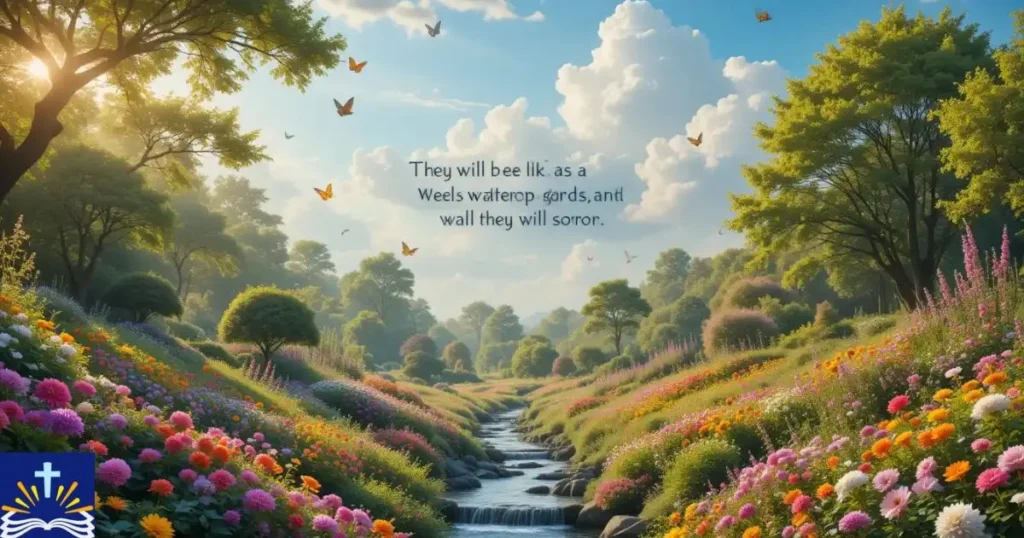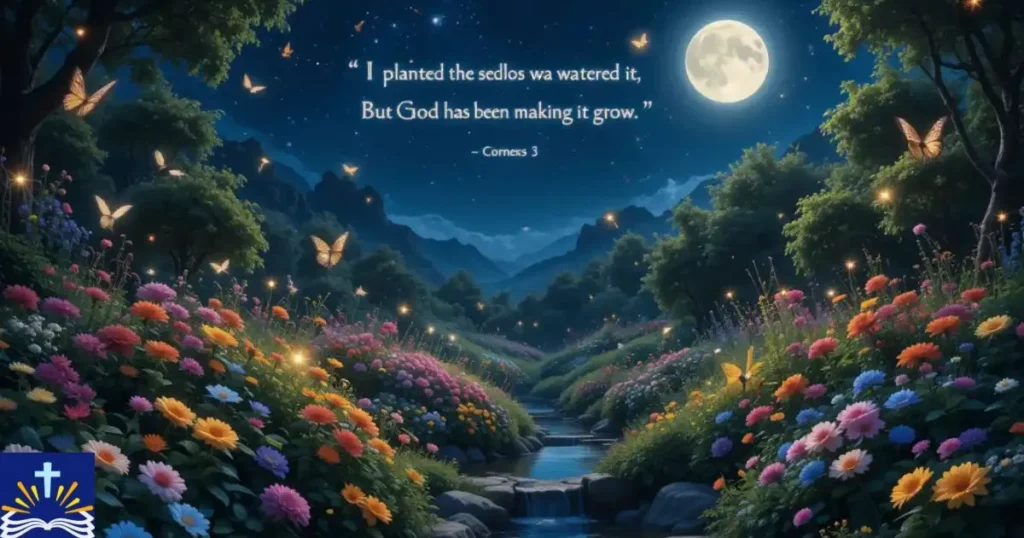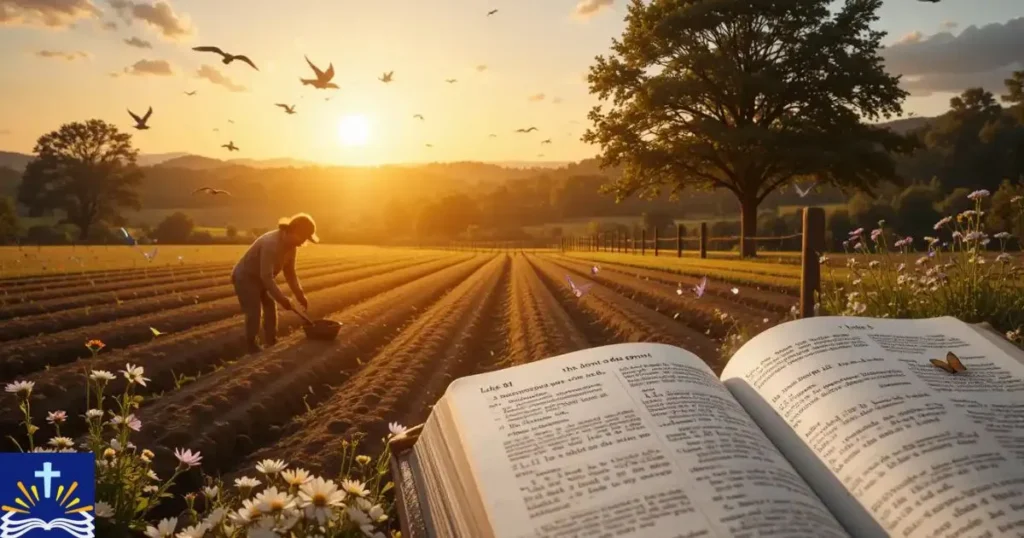The Garden of Eden serves as the earliest example of gardening in the Bible, illustrating the deep spiritual roots of tending to the earth. Throughout Scripture, agricultural metaphors are used, with Jesus Christ often referencing nature to teach profound lessons.
The act of tending to plants encourages us to nurture life, experience spiritual growth, and appreciate the beauty of nature. Whether planting flowers or vegetables, gardening reflects divine care and the importance of cultivating our lives with faith.
As we work with the earth, we deepen our relationship with God, understanding that spiritual nourishment and growth require effort, just like tending the soil of our hearts and aligning our actions in faith.
List of gardens in the Bible
- Garden of Eden – The first garden, created by God as a paradise for Adam and Eve (Genesis 2:8-10).
- Garden of Gethsemane – Where Jesus prayed before His arrest and crucifixion (Matthew 26:36-46, Mark 14:32-42, Luke 22:39-46).
- King Solomon’s Garden – Mentioned in the poetic descriptions of love and beauty (Song of Solomon 4:12-16).
- Garden of Uzzah – A burial place for King Manasseh in Jerusalem (2 Kings 21:18, 26).
- Royal Gardens of Babylon – Mentioned in relation to Nebuchadnezzar and his grandeur (Daniel 4:29-30, though possibly linked to the Hanging Gardens).
- Garden in the Palace of Ahasuerus – Where a banquet was held in the Book of Esther (Esther 1:5, 7:7-8).
- Joseph of Arimathea’s Garden – The place where Jesus was buried after the crucifixion (John 19:41-42)
Bible verse about gardens and flowers

- Isaiah 40:8 – “The grass withers, the flower fades, but the word of our God will stand forever.”
- Matthew 6:28-29 – “And why do you worry about clothes? See how the flowers of the field grow. They do not labor or spin. Yet I tell you that not even Solomon in all his splendor was dressed like one of these.”
- Psalm 103:15-16 – “The life of mortals is like grass, they flourish like a flower of the field; the wind blows over it and it is gone, and its place remembers it no more.”
- Song of Solomon 2:12 – “Flowers appear on the earth; the season of singing has come, the cooing of doves is heard in our land.”
- James 1:10-11 – “But the rich should take pride in their humiliation—since they will pass away like a wild flower. For the sun rises with scorching heat and withers the plant; its blossom falls and its beauty is destroyed.”
Top Bible Verses About Gardening

Genesis 2:15
“The Lord God took the man and put him in the garden of Eden to work it and keep it.”
This verse speaks of the very first garden—Eden. God created the garden as a place for Adam to tend and care for. Gardening was not just a task but a divine calling. This act of working the garden was part of Adam’s role as a steward of God’s creation. In this verse, gardening symbolizes the responsibility humans have to nurture and care for God’s creation, which is a joyful and purposeful act.
Isaiah 58:11
“And the Lord will guide you continually and satisfy your desire in scorched places and make your bones strong; and you shall be like a watered garden, like a spring of water, whose waters do not fail.”
This verse provides a beautiful image of spiritual renewal. It compares the rejuvenation of God’s people to a well-watered garden, signifying vitality and abundance. When we align ourselves with God’s will, He nourishes and restores us, much like a garden needs water to flourish.
John 15:1-2
“I am the true vine, and my Father is the vinedresser. Every branch in me that does not bear fruit he takes away, and every branch that does bear fruit he prunes, that it may bear more fruit.”
In this passage, Jesus uses the image of a vine and branches to explain the relationship between Him, God, and His followers. Just as a gardener prunes a vine to help it grow more fruit, God prunes His people to help them grow spiritually.
Psalm 1:3
“He is like a tree planted by streams of water that yields its fruit in its season, and its leaf does not wither. In all that he does, he prospers.”
This verse presents the image of a tree planted by water that flourishes and yields fruit. It speaks to the benefits of following God’s teachings and living a righteous life. Just as a tree thrives near a water source, so too do we thrive when we stay close to God and His word.
Matthew 13:31-32
“He put another parable before them, saying, ‘The kingdom of heaven is like a grain of mustard seed that a man took and sowed in his field. It is the smallest of all seeds, but when it has grown it is the largest of garden plants and becomes a tree, so that the birds of the air come and make nests in its branches.’”
In this parable, Jesus compares the kingdom of heaven to a mustard seed, which starts small but grows into a large tree. This illustrates the power of small beginnings and how faith, even in its smallest form, can lead to great things.
Jeremiah 29:5
“Build houses and live in them; plant gardens and eat their produce.”
In this verse, God is speaking to the Israelites in exile, telling them to plant gardens and live life even in a foreign land. Gardening here is about resilience and making the best of circumstances, even when life seems uncertain or challenging.
1 Corinthians 3:6-7
“I planted, Apollos watered, but God gave the growth. So neither he who plants nor he who waters is anything, but only God who gives the growth.”
This passage underscores that while human efforts in planting and watering are important, it is ultimately God who causes growth. It emphasizes that we are partners with God in His work, but the outcome is in His hands.
Song of Solomon 4:16
“Awake, O north wind, and come, O south wind! Blow upon my garden, let its spices flow. Let my beloved come to his garden, and eat its choicest fruits.”
This verse is from the Song of Solomon, which uses garden imagery to express love and desire. It speaks of a garden full of spices and fruits, which can be seen as a metaphor for the richness and beauty of a loving relationship.
Isaiah 61:11
“For as the earth brings forth its sprouts, and as a garden causes what is sown in it to sprout up, so the Lord God will cause righteousness and praise to sprout up before all the nations.”
This verse draws a parallel between the earth’s growth and the righteousness that God will bring forth in the world. Just as gardens yield produce, God promises to bring forth righteousness and praise through His people.
James 5:7
“Be patient, therefore, brothers, until the coming of the Lord. See how the farmer waits for the precious fruit of the earth, being patient about it until it receives the early and the late rains.”
This verse encourages patience, likening it to a farmer who waits for the harvest. It reminds us that just as crops take time to grow, so too does the fulfillment of God’s promises require patience.
God’s Creation and Care for the Garden

Genesis 1:11-12
In Genesis 1:11-12, God creates the earth’s vegetation and declares that it is good. “Then God said, ‘Let the earth bring forth grass, the herb that yields seed, and the fruit tree that yields fruit according to its kind, whose seed is in itself, on the earth.”And it came to pass. The earth produced vibrant grass, herbs yielding seeds of their own kind, and trees bearing fruit, each containing seeds within, true to their kind. And God observed that it was excellent.”
This passage reflects God’s intention for creation to be full of life and sustenance. God’s care for the garden and the natural world is evident, as He provides plants to grow, bear fruit, and sustain life. It reminds us that gardening is an extension of God’s original plan for a fruitful and abundant world.
Isaiah 35:1-2
Isaiah 35:1-2 describes a desert blossoming, showing the transformation of barren land into a beautiful, flourishing garden. “The wilderness and the wasteland shall be glad for them, and the desert shall rejoice and blossom as the rose; It shall blossom abundantly and rejoice, even with joy and singing.”
This verse symbolizes God’s restorative power, turning what is dry and desolate into something beautiful and thriving. For gardeners, it’s a reminder that even the hardest of soil can produce life with proper care, much like how faith can transform barren spiritual lives into ones filled with growth and joy.
Genesis 9:3
In Genesis 9:3, after the flood, God tells Noah, “Every moving thing that lives shall be food for you. I have given you all things, even as the green herbs.” Here, God emphasizes His provision, ensuring that individuals has what they need for sustenance. The mention of green herbs further highlights the importance of plants in God’s creation and His provision for His people.
Psalm 65:9-10
Psalm 65:9-10 praises God for His care over the land, ensuring that it is fertile and abundant. “You visit the earth and water it, You greatly enrich it; The river of God is full of water; You provide their grain, For so You have prepared it. You water its ridges abundantly, You settle its furrows; You make it soft with showers, You bless its growth.”
This passage illustrates how God nurtures and tends to the earth, making it fruitful. It speaks to the joy and gratitude gardeners can feel as they witness the abundant harvests that result from God’s care for creation.
Ezekiel 36:34-36
In Ezekiel 36:34-36, God promises to restore the land, turning it from waste into fruitful grounds once more. “The desolate land shall be tilled instead of lying desolate in the sight of all who pass by. So they will say, ‘This land that was desolate has become like the garden of Eden.’”
This shows that God has the power to restore even the most desolate places, whether they be physical land or spiritual hearts. It reinforces the idea that growth and transformation are possible through God’s intervention.
Fruitfulness and Abundance
Galatians 6:7
Galatians 6:7 teaches that we reap what we sow: “Do not be deceived: God is not mocked; for whatever a man sows, that he will also reap.” This verse applies both to gardening and to spiritual life. Just as a gardener reaps the harvest of what they sow, so too do we reap the consequences of our actions. It encourages us to sow good seeds in our lives and trust that God will provide an abundant harvest.
Psalm 107:37-38
Psalm 107:37-38 highlights the fruitfulness of God’s provision: “And sow the fields, and plant vineyards, That they may yield a fruitful harvest. He also blesses them, and they multiply greatly; And He does not let their cattle decrease.”
These verses show how God blesses the work of our hands and ensures that the land provides abundantly. For gardeners, it’s an encouragement to continue sowing seeds and nurturing plants, knowing that God blesses the work and brings fruitfulness.
Proverbs 11:30
Proverbs 11:30 emphasizes the importance of righteousness in achieving fruitfulness: “The fruit of the righteous is a tree of life, And he who wins souls is wise.” This verse connects the concept of a fruitful life with both physical gardens and spiritual growth. A righteous life, like a well-tended garden, bears much fruit.
Hosea 10:12
Hosea 10:12 tells us to “Sow for yourselves righteousness; Reap in mercy; Break up your fallow ground, For it is time to seek the Lord, Till He comes and rains righteousness on you.”
This passage speaks to the importance of preparing the soil—both literally and metaphorically—for growth. Just as a garden requires effort, so does spiritual growth. By sowing righteousness, we can expect to reap God’s mercy and blessings.
Colossians 1:10
Colossians 1:10 encourages us to “Walk worthy of the Lord, fully pleasing Him, being fruitful in every good work and increasing in the knowledge of God.” This verse aligns our actions with spiritual growth, showing that our lives can be fruitful when we seek God’s will and live in accordance with His purposes.
Bible Verses About Arrogance and Humility
Spiritual Growth and Gardening

John 15:4
In John 15:4, Jesus compares Himself to the vine, and we to the branches: “Abide in Me, and I in you. As the branch cannot bear fruit of itself, unless it abides in the vine, neither can you, unless you abide in Me.”
This verse emphasizes that spiritual growth, like gardening, requires staying connected to the source—Jesus. A branch can only bear fruit when it is connected to the vine, just as we can only grow spiritually when we remain rooted in Christ.
Matthew 13:23
Matthew 13:23 discusses the parable of the sower, stating: “But he who received seed on the good ground is he who hears the word and understands it, who indeed bears fruit and produces: some a hundredfold, some sixty, some thirty.”
This passage underscores the importance of a receptive heart for spiritual growth. Just as good soil produces a plentiful harvest, a heart that receives God’s word will bear much fruit in our lives.
Galatians 5:22-23
Galatians 5:22-23 lists the fruit of the Spirit, saying, “But the fruit of the Spirit is love, joy, peace, forbearance, kindness, goodness, faithfulness, gentleness, and self-control.”
These qualities are spiritual fruits that should be evident in our lives as we grow closer to God. Like a garden full of healthy plants, our lives should produce these virtues.
Ephesians 3:17
Ephesians 3:17 tells us that Christ should dwell in our hearts: “That Christ may dwell in your hearts through faith; that you, being rooted and grounded in love.”
Being rooted in Christ is essential for spiritual growth. Just as a garden needs good soil, we need a foundation in Christ to grow spiritually.
Philippians 1:11
Philippians 1:11 encourages us to be filled with the fruit of righteousness: “Being filled with the fruits of righteousness which are by Jesus Christ, to the glory and praise of God.”
Our lives should bear the fruit of righteousness as a result of our relationship with Christ. Just as a well-tended garden bears good fruit, our lives should reflect the love and righteousness of God.
Labor and Reward in Gardening
Proverbs 28:19
Proverbs 28:19 states, “He who tills his land will have plenty of bread, But he who follows frivolity will have poverty enough!”
This verse highlights the value of hard work and diligence in gardening. A farmer who works the land diligently will reap a plentiful harvest, while someone who neglects their work will not see the rewards.
2 Corinthians 9:6
2 Corinthians 9:6 teaches that, “But this I say: He who sows sparingly will also reap sparingly, and he who sows bountifully will also reap bountifully.”
This verse encourages generosity and hard work, both in physical gardening and in our spiritual lives. The more effort we put into planting and nurturing, the greater the reward.
1 Corinthians 15:58
1 Corinthians 15:58 encourages us to remain steadfast in our labor: “Therefore, my beloved brethren, be steadfast, immovable, always abounding in the work of the Lord, knowing that your labor is not in vain in the Lord.”
This reminds us that our efforts in gardening and life are meaningful when done in faith and with a purpose.
Proverbs 12:11
Proverbs 12:11 encourages us to focus on our work: “He who tills his land will be satisfied with bread, but he who follows frivolity is devoid of understanding.”
This verse speaks to the importance of diligent work and avoiding distractions. Just as a garden needs care and attention, our lives require focus to yield fruit.
Ecclesiastes 11:6
Ecclesiastes 11:6 tells us to “In the morning sow your seed, and in the evening do not withhold your hand; for you do not know which will prosper, either this or that, or whether both alike will be good.”
This verse encourages persistent effort, reminding us that sowing seed at the right time and continually working will lead to a fruitful outcome.
Parables and Lessons from Gardening
Matthew 13:3-9
In this passage, Jesus tells the Parable of the Sower. It explains how a farmer sows seeds on different types of soil—some on rocky ground, some on thorny ground, and some on good soil. The seeds that fall on good soil grow and produce a plentiful harvest, while the others fail to take root or bear fruit.
Mark 4:26-29
Mark’s version of the parable of the growing seed talks about how a farmer scatters seed, and although he does not understand how it grows, it eventually produces a harvest.
Luke 8:15
In this verse, Jesus explains that the seeds sown on good soil are those who hear the Word, retain it, and bear fruit with patience.
God’s Blessing on the Land
Deuteronomy 28:8
God promises to bless the land and give abundant harvests as a reward for obedience to His commands.
Leviticus 26:4
God assures His people that He will send rain in its season and bless the crops of the land.
Psalm 85:12
“The Lord will indeed give what is good, and our land will yield its harvest.”
Joel 2:22
This verse speaks about the blessings of abundant harvests following times of desolation.
Zechariah 8:12
“The seed will grow well, the vine will yield its fruit, the ground will produce its crops, and the heavens will drop their dew.”
Seeds and Planting

Matthew 17:20
Jesus tells His disciples that if they have faith as small as a mustard seed, they can move mountains.
Mark 4:8
Other seeds fell on good soil and produced a crop, multiplying thirty, sixty, or even a hundred times.
2 Corinthians 9:10
“Now he who supplies seed to the sower and bread for food will also supply and increase your store of seed and will enlarge the harvest of your righteousness.”
Isaiah 55:10
“As the rain and the snow come down from heaven, and do not return to it without watering the earth, making it bud and flourish, so that it yields seed for the sower and bread for the eater.”
James 3:18
“Peacemakers who sow in peace reap a harvest of righteousness.”
God’s Provision Through Nature
Genesis 1:29
God gives man every seed-bearing plant on the earth as food.
Psalm 104:14
“He makes grass grow for the cattle, and plants for people to cultivate—bringing forth food from the earth.”
Deuteronomy 11:14
“Then I will send rain on your land in season, both autumn and spring rains, so that you may gather in your grain, new wine, and olive oil.”
Acts 14:17
“Yet he has not left himself without testimony: He has shown kindness by giving you rain from heaven and crops in their seasons; he provides you with plenty of food and fills your hearts with joy.”
Hosea 2:21-22
“In that day I will respond,” declares the Lord—”I will respond to the skies, and they will respond to the earth; and the earth will respond to the grain, the new wine, and the olive oil.”
Harvest and Reaping
Matthew 9:37-38
Jesus tells His disciples, “The harvest is plentiful but the workers are few.”
Revelation 14:15
“Take your sickle and reap, because the time to reap has come, for the harvest of the earth is ripe.”
Galatians 6:9
“Let us not become weary in doing good, for at the proper time we will reap a harvest if we do not give up.”
Proverbs 10:5
“He who gathers crops in summer is a prudent son, but he who sleeps during harvest is a disgraceful son.”
John 4:35
“Do you not say, ‘Four months more and then the harvest’? I tell you, open your eyes and look at the fields! They are ripe for harvest.”
Biblical Principles on the Joy of Gardening
| Biblical Principle | Application | Scripture Reference |
| Stewardship of Creation | Gardeners care for God’s creation, cultivating life. | Genesis 2:15 |
| God Provides Growth | Trust in God’s provision for growth and harvest. | 1 Corinthians 3:7 |
| Rejoicing in the Harvest | Celebrate the fruit of labor as a gift from God. | Galatians 6:9 |
| Beauty in Creation | Find joy in the beauty of plants and nature. | Psalm 19:1 |
| Peace and Patience | Gardening teaches patience and peace in God’s timing. | James 5:7 |
Key Insight
1. What are some Bible verses related to the joy of gardening?
The Bible offers several verses, like Matthew 13:3-9 and Genesis 1:29, that highlight God’s creation and the joy found in planting and nurturing.
2. How can gardening teach spiritual lessons?
Gardening teaches patience, growth, and faith, just as we learn from Mark 4:26-29 and James 3:18 about the growth of seeds and the fruit of righteousness.
3. What role does God’s blessing play in gardening?
God’s blessings on the land are evident in verses like Deuteronomy 28:8 and Psalm 85:12, which show how God provides for the land’s productivity.
4. How can seeds and planting be connected to faith?
In Matthew 17:20 and Isaiah 55:10, planting seeds represents faith in God’s power to grow and nurture both our spiritual lives and the world around us.
5. Why is harvest and reaping an important theme in the Bible?
The Bible teaches that reaping what is sown, like in Galatians 6:9 and Matthew 9:37-38, relates to the rewards of hard work, faith, and God’s timing in our lives.
Conclusion:
Gardening is more than just a hobby—it is a spiritual practice that connects us with the deeper truths of God’s creation and His divine blessings. From the sowing of seeds to the reaping of harvests, gardening offers valuable lessons about faith, patience, and trust in God. Through the Bible, we are reminded that every season of growth, every act of nurturing, and every harvest are part of God’s perfect plan for our lives.
As we cultivate the earth and our faith, we are also cultivating a deeper relationship with God, who is the ultimate gardener of our hearts.

Hi! I’m Ethan Matthews, a tech enthusiast and avid traveler, sharing insights and adventures from my journeys around the globe.










